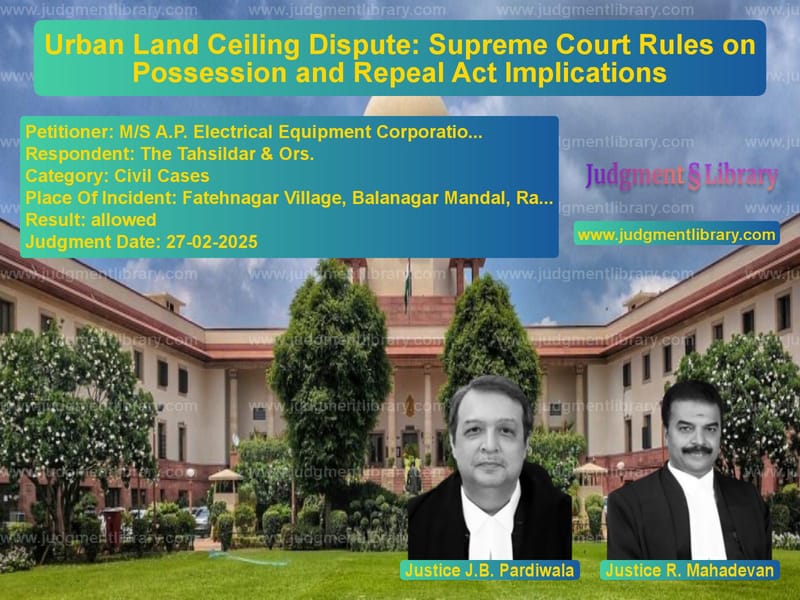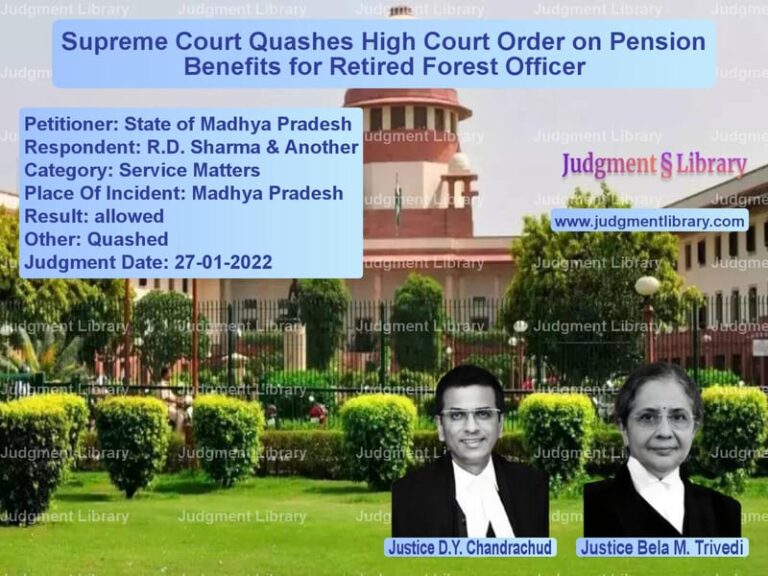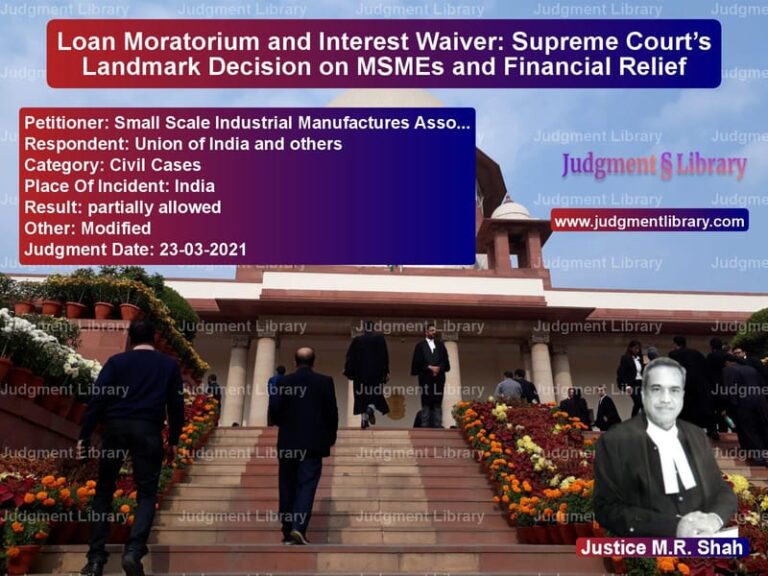Urban Land Ceiling Dispute: Supreme Court Rules on Possession and Repeal Act Implications
The case of M/S A.P. Electrical Equipment Corporation vs. The Tahsildar & Ors. is a significant ruling regarding land acquisition under the Urban Land (Ceiling and Regulation) Act, 1976, and the impact of its repeal through the Urban Land (Ceiling and Regulation) Repeal Act, 1999. The Supreme Court was tasked with determining whether the government had taken valid possession of surplus land before the Act’s repeal and whether the state’s claim was legally sustainable.
Background of the Case
The appellant, M/S A.P. Electrical Equipment Corporation, engaged in the manufacturing of electrical transformers, had acquired land in Fatehnagar, Telangana. Due to the enactment of the Urban Land Ceiling Act, the company was required to declare its holdings, leading to a series of legal disputes over whether portions of the land fell under the ceiling limits.
The government initially exempted some portions of the land from the ceiling provisions. However, it later withdrew these exemptions and issued orders acquiring what it deemed ‘excess land.’ The core dispute in the case was whether the government had physically taken possession of the disputed land before the repeal of the Urban Land Ceiling Act, which would determine the legal standing of the acquisition.
Read also: https://judgmentlibrary.com/supreme-court-upholds-impleadment-of-legal-heir-in-property-dispute/
Key Legal Issues
- Whether the government followed the proper procedures under Sections 10(5) and 10(6) of the Urban Land Ceiling Act.
- Whether a mere declaration of vesting of land constituted actual possession.
- Whether the state’s reliance on a panchnama (official document recording possession) was legally valid.
- Whether the repeal of the Act nullified any claims made by the government.
Petitioner’s Arguments (M/S A.P. Electrical Equipment Corporation)
The petitioners argued that the government’s claim of possession was fraudulent and procedurally flawed. The key arguments made by the petitioners included:
- The notices required under Section 10(5) were never properly served to the company, violating the statutory requirement for notifying landowners before taking possession.
- The state claimed to have taken possession under Section 10(6), but the possession process was carried out hastily, even before the statutory 30-day period had elapsed.
- The government relied on a panchnama as evidence of possession, but this document lacked proper verification, signatures, and credible witnesses.
- The land in question was still occupied by the petitioner, with factory operations, buildings, and equipment present, proving that actual possession was never taken by the state.
- The Repeal Act, 1999, should have the effect of nullifying any incomplete acquisitions where physical possession was not established.
The petitioner’s counsel argued:
“The government cannot take land merely by issuing a notification. Possession under the Act requires actual and physical control over the land, which did not occur in this case.”
Respondent’s Arguments (The State Government)
The respondents, representing the state government, argued that:
- Possession was lawfully taken through a duly recorded panchnama, which serves as an official record of possession.
- The affixation of notices on the factory premises and entry in revenue records was sufficient to establish possession.
- Any procedural lapses, if present, did not invalidate the acquisition.
- Even though the Repeal Act was enacted in 1999, the proceedings initiated before its enactment should remain valid.
The respondents’ counsel contended:
“The state has followed all required legal procedures. The land was vested in the government, and possession was taken according to the statutory requirements.”
Supreme Court’s Observations
The Supreme Court critically analyzed the procedural requirements for taking possession under the Urban Land Ceiling Act and examined whether these had been followed in this case.
The Court observed:
- The provisions of Section 10(5) and 10(6) are mandatory, and non-compliance renders possession claims invalid.
- A mere panchnama without corroborating evidence cannot be the sole proof of possession.
- The state’s claim was contradicted by the continued presence of the company on the land, making it evident that possession was never physically taken.
- The Repeal Act, 1999, was enacted to protect landowners from arbitrary acquisitions, and incomplete acquisitions were nullified by its enactment.
- The burden of proving possession lies with the state, and in this case, the government failed to meet the legal threshold required.
The Court ruled:
“The requirement of giving notice under Sections 10(5) and 10(6) is mandatory. Failure to comply with these provisions results in an illegal dispossession. The state cannot claim possession through a defective panchnama.”
Key Takeaways
- Mere declaration of land as surplus does not automatically equate to government possession.
- Physical possession requires actual entry and control over the land, which was absent in this case.
- Panchnama records must be corroborated by independent evidence.
- The Urban Land Ceiling Repeal Act protects landowners from incomplete acquisitions.
- Procedural lapses in land acquisition can invalidate government claims.
Final Judgment
The Supreme Court ruled in favor of the petitioner:
- The state’s acquisition of land was declared null and void.
- The company’s ownership was restored.
- The government was restrained from interfering with the land.
- All revenue records reflecting government ownership were ordered to be corrected.
The Court concluded:
“The government’s failure to follow statutory requirements has vitiated the entire acquisition. Possession was never taken, and the land remains with the petitioner.”
Conclusion
This ruling reinforces key legal principles in land acquisition cases:
- The state must prove actual possession when claiming land acquisition.
- Failure to follow proper procedures results in the reversal of government actions.
- Landowners have strong protection under the Urban Land Ceiling Repeal Act.
- Government claims of possession must be backed by verifiable evidence, not just official paperwork.
This judgment serves as a landmark decision protecting property rights and ensuring that land acquisition laws are strictly followed to prevent arbitrary state actions.
Petitioner Name: M/S A.P. Electrical Equipment Corporation.Respondent Name: The Tahsildar & Ors..Judgment By: Justice J.B. Pardiwala, Justice R. Mahadevan.Place Of Incident: Fatehnagar Village, Balanagar Mandal, Rangareddy District, Telangana.Judgment Date: 27-02-2025.
Don’t miss out on the full details! Download the complete judgment in PDF format below and gain valuable insights instantly!
Download Judgment: ms-a.p.-electrical-vs-the-tahsildar-&-ors.-supreme-court-of-india-judgment-dated-27-02-2025.pdf
Directly Download Judgment: Directly download this Judgment
See all petitions in Property Disputes
See all petitions in Landlord-Tenant Disputes
See all petitions in Specific Performance
See all petitions in Damages and Compensation
See all petitions in Judgment by J.B. Pardiwala
See all petitions in Judgment by R. Mahadevan
See all petitions in allowed
See all petitions in supreme court of India judgments February 2025
See all petitions in 2025 judgments
See all posts in Civil Cases Category
See all allowed petitions in Civil Cases Category
See all Dismissed petitions in Civil Cases Category
See all partially allowed petitions in Civil Cases Category







